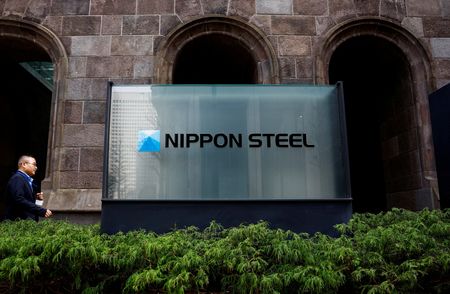By Alden Bentley and Amanda Cooper
NEW YORK/LONDON (Reuters) -U.S. indexes bucked steady global equity markets overnight and Treasury yields fell to 2-1/2 month lows, trading off signs of softening U.S. growth and uncertainty over Trump administration policies while Germany’s election result was buoying the euro.
Nervousness about Nvidia’s fourth quarter results after the market close on Wednesday hung over the market. Friday’s Personal Consumption Expenditures price index release, which the Federal Reserve tracks for its mandate to control inflation, was also in focus.
Investors were briefly rattled by an order from U.S. President Donald Trump to limit Chinese investments in strategic U.S. sectors such as chips, AI and aerospace.
A weak read on U.S. consumer confidence added to the negative mood, with the S&P 500 <.SPX > last down 0.73%, while the yield on the benchmark 10-year yield fell below 4.30% to its lowest since December 12.
“Bearish growth sentiment – from last Friday’s weak PMIs, perhaps, or geopolitical jitters – is bound to linger until something substantive convinces investors otherwise,” FHN Financial macro strategist Will Campernolle said in a note on Tuesday. He added that Treasury coupon auctions on Tuesday and Wednesday could test the durability of the rally, at least until the release of Friday’s January PCE inflation report.
The Dow Jones Industrial Average was off 0.15% and the Nasdaq Composite fell 1.43% in early trade.
The 10-year yield was down 9.5 basis points at 4.298% while the 2-year note yield, which typically moves in step with interest rate expectations for the Fed, fell 7.8 basis points to 4.09%, hitting its lowest since December 6.
In Europe, the STOXX 600 rose 0.9%, while the euro was up 0.45% at $1.0513 near the one-month high reached on Monday after Friedrich Merz’s opposition conservatives won Germany’s national election.
The dollar index, which measures the greenback against a basket of currencies dominated by the euro and yen, was off about half a percent.
The euro is up around 1% so far this year, but is still one of the worst-performing major currencies against the dollar, given its high exposure to the risk of tariffs.
Trump’s planned duties on U.S. imports risk pushing up domestic inflation, while his mass firings of government employees could impact the labour market, just when the Federal Reserve needs room to cut interest rates.
Tension between the U.S. and Europe has also risen over Ukraine and how to broker a ceasefire agreement with Russia, three years after Moscow’s full-blown invasion of its neighbour.
Sentiment in the markets is fragile but there has been little in the way of volatility, according to Chris Beauchamp, chief strategist at IG.
“This is a sharp contrast to the past couple of years where crises seem to come one at a time and then, you could just deal with them when they occurred, and now it seems to be ‘everything, everywhere, all at once’,” he said.
REASONS FOR OPTIMISM?
CBOE’s VIX volatility index rose to its highest in a month on Tuesday, but so far has fallen short of the peak from late January.
Beauchamp said there are reasons to be optimistic.
“If you look at earnings season, it’s gone really well. But of course, the headlines and the signs of fracture between Europe and the U.S. – it doesn’t directly affect … stocks, but it just makes sentiment all the more febrile.”
Meanwhile, negative surprises in U.S. economic data have accelerated this month, led by unwelcome pickups in things like consumer inflation expectations and, most recently, by a drop in overall business activity.
The futures market shows traders expect the Fed to cut rates by around 50 basis points this year, up from 40 bps a week ago.
Treasury Secretary Scott Bessent argued on Tuesday that the U.S. economy is more fragile under the surface than economic metrics suggest, citing interest rate volatility, sticky inflation and job growth focused on the government sector.
Since China’s low-cost AI model from DeepSeek burst onto the scene in late January, investors have begun to question whether the hefty spending on this technology is justified and a lot will be riding on Nvidia’s fourth-quarter earnings.
Having pushed stocks on both sides of the Atlantic to record highs this month, investors are getting uneasy about results from Nvidia, which has come to characterise the boom in artificial intelligence investment and could prove instrumental in setting the mood for the remainder of the quarter.
Chinese retail investors have poured into AI-linked stocks on the domestic market this month, sending the Hong Kong equity index to three-year highs.
A Bloomberg report overnight that Washington is seeking to toughen restrictions on the export of semiconductor technology to China, with the help of allies, sent shares in tech giant Alibaba down 3%.
Trump also indicated overnight that proposed tariffs on Mexico and Canada were still set to start next week, which nudged the U.S. dollar up marginally against its Canadian counterpart.
In commodities, Brent crude futures fell 1.7% to $73.54 a barrel, U.S. crude fell 1.77% to $69.46, while gold fell 0.8% to $2,930 an ounce, having hit a record high of $2,956.15 on Monday.
Bitcoin ran into some profit-taking, falling by as more than 7% to below $87,000, as traders continued to process last week’s hack of $1.5 billion worth of ether from cryptoexchange Bybit.
(Additional reporting by Stella Qiu in Sydney; Editing by Gerry Doyle, Jamie Freed, Sharon Singleton, William Maclean and Mark Heinrich)









